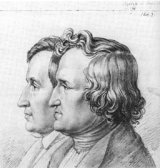Iron Hans
"Iron Hans" is a fascinating fairy tale by The Brothers Grimm that follows the story of a young boy who accidentally released Iron Hans, a wild man, from his cage. Iron Hans then requests the boy as a companion and promises the boy's father that he will return unharmed. The story takes exciting twists and turns as the boy gets various life lessons from Iron Hans and eventually becomes a king. Meanwhile, Iron Hans is released from a curse and turns out to be a powerful king as well. The tale is often interpreted as a coming-of-age story that signifies a boy's transition to adulthood.
Genre: Children
Genre: Children
- 24 Views
There was once upon a time a king who had a great forest near his palace, full of all kinds of wild animals. One day he sent out a huntsman to shoot him a roe, but he did not come back. ‘Perhaps some accident has befallen him,’ said the king, and the next day he sent out two more huntsmen who were to search for him, but they too stayed away. Then on the third day, he sent for all his huntsmen, and said: ‘Scour the whole forest through, and do not give up until you have found all three.’ But of these also, none came home again, none were seen again. From that time forth, no one would any longer venture into the forest, and it lay there in deep stillness and solitude, and nothing was seen of it, but sometimes an eagle or a hawk flying over it. This lasted for many years, when an unknown huntsman announced himself to the king as seeking a situation, and offered to go into the dangerous forest. The king, however, would not give his consent, and said: ‘It is not safe in there; I fear it would fare with you no better than with the others, and you would never come out again.’ The huntsman replied: ‘Lord, I will venture it at my own risk, of fear I know nothing.’ The huntsman therefore betook himself with his dog to the forest. It was not long before the dog fell in with some game on the way, and wanted to pursue it; but hardly had the dog run two steps when it stood before a deep pool, could go no farther, and a naked arm stretched itself out of the water, seized it, and drew it under. When the huntsman saw that, he went back and fetched three men to come with buckets and bale out the water. When they could see to the bottom there lay a wild man whose body was brown like rusty iron, and whose hair hung over his face down to his knees. They bound him with cords, and led him away to the castle. There was great astonishment over the wild man; the king, however, had him put in an iron cage in his courtyard, and forbade the door to be opened on pain of death, and the queen herself was to take the key into her keeping. And from this time forth everyone could again go into the forest with safety. The king had a son of eight years, who was once playing in the courtyard, and while he was playing, his golden ball fell into the cage. The boy ran thither and said: ‘Give me my ball out.’ ‘Not till you have opened the door for me,’ answered the man. ‘No,’ said the boy, ‘I will not do that; the king has forbidden it,’ and ran away. The next day he again went and asked for his ball; the wild man said: ‘Open my door,’ but the boy would not. On the third day the king had ridden out hunting, and the boy went once more and said: ‘I cannot open the door even if I wished, for I have not the key.’ Then the wild man said: ‘It lies under your mother’s pillow, you can get it there.’ The boy, who wanted to have his ball back, cast all thought to the winds, and brought the key. The door opened with difficulty, and the boy pinched his fingers. When it was open the wild man stepped out, gave him the golden ball, and hurried away. The boy had become afraid; he called and cried after him: ‘Oh, wild man, do not go away, or I shall be beaten!’ The wild man turned back, took him up, set him on his shoulder, and went with hasty steps into the forest. When the king came home, he observed the empty cage, and asked the queen how that had happened. She knew nothing about it, and sought the key, but it was gone. She called the boy, but no one answered. The king sent out people to seek for him in the fields, but they did not find him. Then he could easily guess what had happened, and much grief reigned in the royal court. When the wild man had once more reached the dark forest, he took the boy down from his shoulder, and said to him: ‘You will never see your father and mother again, but I will keep you with me, for you have set me free, and I have compassion on you. If you do all I bid you, you shall fare well. Of treasure and gold have I enough, and more than anyone in the world.’ He made a bed of moss for the boy on which he slept, and the next morning the man took him to a well, and said: ‘Behold, the gold well is as bright and clear as crystal, you shall sit beside it, and take care that nothing falls into it, or it will be polluted. I will come every evening to see if you have obeyed my order.’ The boy placed himself by the brink of the well, and often saw a golden fish or a golden snake show itself therein, and took care that nothing fell in. As he was thus sitting, his finger hurt him so violently that he involuntarily put it in the water. He drew it quickly out again, but saw that it was quite gilded, and whatsoever pains he took to wash the gold off again, all was to no purpose. In the evening Iron Hans came back, looked at the boy, and said: ‘What has happened to the well?’ ‘Nothing nothing,’ he answered, and held his finger behind his back, that the man might not see it. But he said: ‘You have dipped your finger into the water, this time it may pass, but take care you do not again let anything go in.’ By daybreak the boy was already sitting by the well and watching it. His finger hurt him again and he passed it over his head, and then unhappily a hair fell down into the well. He took it quickly out, but it was already quite gilded. Iron Hans came, and already knew what had happened. ‘You have let a hair fall into the well,’ said he. ‘I will allow you to watch by it once more, but if this happens for the third time then the well is polluted and you can no longer remain with me.’ On the third day, the boy sat by the well, and did not stir his finger, however much it hurt him. But the time was long to him, and he looked at the reflection of his face on the surface of the water. And as he still bent down more and more while he was doing so, and trying to look straight into the eyes, his long hair fell down from his shoulders into the water. He raised himself up quickly, but the whole of the hair of his head was already golden and shone like the sun. You can imagine how
Translation
Translate and read this book in other languages:
Select another language:
- - Select -
- 简体中文 (Chinese - Simplified)
- 繁體中文 (Chinese - Traditional)
- Español (Spanish)
- Esperanto (Esperanto)
- 日本語 (Japanese)
- Português (Portuguese)
- Deutsch (German)
- العربية (Arabic)
- Français (French)
- Русский (Russian)
- ಕನ್ನಡ (Kannada)
- 한국어 (Korean)
- עברית (Hebrew)
- Gaeilge (Irish)
- Українська (Ukrainian)
- اردو (Urdu)
- Magyar (Hungarian)
- मानक हिन्दी (Hindi)
- Indonesia (Indonesian)
- Italiano (Italian)
- தமிழ் (Tamil)
- Türkçe (Turkish)
- తెలుగు (Telugu)
- ภาษาไทย (Thai)
- Tiếng Việt (Vietnamese)
- Čeština (Czech)
- Polski (Polish)
- Bahasa Indonesia (Indonesian)
- Românește (Romanian)
- Nederlands (Dutch)
- Ελληνικά (Greek)
- Latinum (Latin)
- Svenska (Swedish)
- Dansk (Danish)
- Suomi (Finnish)
- فارسی (Persian)
- ייִדיש (Yiddish)
- հայերեն (Armenian)
- Norsk (Norwegian)
- English (English)
Citation
Use the citation below to add this book to your bibliography:
Style:MLAChicagoAPA
"Iron Hans Books." Literature.com. STANDS4 LLC, 2024. Web. 2 May 2024. <https://www.literature.com/book/iron_hans_2127>.




Discuss this Iron Hans book with the community:
Report Comment
We're doing our best to make sure our content is useful, accurate and safe.
If by any chance you spot an inappropriate comment while navigating through our website please use this form to let us know, and we'll take care of it shortly.
Attachment
You need to be logged in to favorite.
Log In